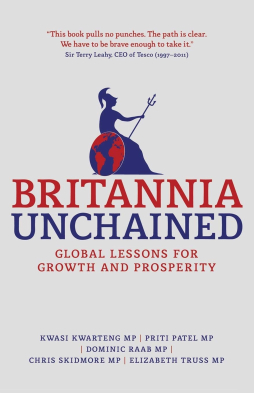Britannia Unchained
 |
|
| Author |
Kwasi Kwarteng Priti Patel Dominic Raab Chris Skidmore Elizabeth Truss |
|---|---|
| Country | United Kingdom |
| Language | English |
| Genre | Treatise |
| Published | 13 September 2012 Palgrave Macmillan |
| Media type | Print (Paperback) |
| Pages | 152 |
| ISBN | |
Britannia Unchained: Global Lessons for Growth and Prosperity is a political book written by several British Conservative Party MPs. It was released on 13 September 2012. Its authors present a treatise, arguing that Britain should adopt a different and radical approach to business and economics or risk "an inevitable slide into mediocrity".
The book is written by Kwasi Kwarteng, Priti Patel, Dominic Raab, Chris Skidmore and Elizabeth Truss – five Tory MPs who were elected in May 2010 and belong to the party's Thatcherite-leaning Free Enterprise Group. The text sets out their vision for the United Kingdom's future as a leading player in the global economy, arguing that Britain needs to adopt a far-reaching form of free market economics, with fewer employment laws, and suggesting the UK should learn lessons from the business and economic practices of other countries, including Canada, Australia and the tiger economies of the Far East like China and Singapore.
An article written by four of the authors for the ConservativeHome website, and published on the day of the book's publication said, "We are convinced that Britain’s best days are not behind us. We cannot afford to listen to the siren voices of the statists who are happy for Britain to become a second rate power in Europe, and a third rate power in the world. Decline is not inevitable."
The content suggests that Britain has lessons to learn from a number of other countries regarding policy, which it claims are outperforming the United Kingdom, and sets out the areas where the UK needs to rethink its strategy, citing examples of countries which the authors believe have been successful in these areas. On deficit reduction the example of Canada during the 1990s is given, where overall spending was reduced by 20% between 1992 and 1997. On education the authors lament the relatively low number of students who study mathematics at A Level, which they say is 15%, contrasting it with Japan where 85% study the subject at a similar level. In the realm of business and economics, Israel is cited as an example of a country that supports innovation, while the United States is given as an example of a nation that supports risk-taking. The willingness of Britain's employees to work hard is compared to that of workers of other countries, with suggestions that a decreasing number of Britain's workers are contributing towards economic growth, through which state spending is enabled to be maintained. It is asserted that this undermines the UK's competitiveness.
...
Wikipedia
